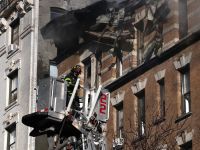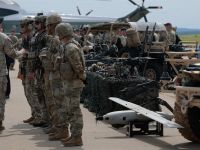Fighting in Tripoli between supporters and opponents of Syria’s Assad regime raged Saturday night and carried on Sunday as the death toll reached twelve with dozens more wounded.
Some of the wounded from the Saturday-Sunday overnight fighting died Sunday.
They were identified as Mahmoud al-Mohammad, a Syrian national who died from his wounds after being hit by sniper gunfire at the Malloulah roundabout and Ali Mahmoud Al-Ahmad, in addition to Mahmoud Hussein, who died of a heart attack while fleeing sniper gunfire in the Zahereyah area.
A soldier identified as Abdullah Ajaj also died from his wounds after being hit by sniper fire while passing near the fighting area.
An additional two people were killed Sunday as a result of the fighting, security sources told The Daily Star.
One of the shells targeted a center for the army in Bab al-Tabbaneh Sunday wounding a man identified as Abu Hasan Al-Jundi who later died from his wounds.
Over 49 people, including 12 soldiers and policemen, were wounded in the fighting.
Army units conducted raids in Tripoli overnight, arrested 8 militants and confiscated their light weapons and ammunitions, a statement from the military said Sunday.
The detainees were handed in to the relevant authorities, the statement said.
Heavy shelling has overwhelmed the city starting Saturday 10:30 p.m. and continued for hours reaching areas that are usually not affected by the fighting, such as Azmi Street and the Maarad road.
Fighting eased early Sunday morning but was resumed at around 9:00 a.m. in light of continued threats between the rival fighters.
Sniper activity at all fronts was reported on Sunday morning, including the international highway that links Tripoli to the northern region of Akkar.
The highway was blocked on Saturday and remained so on Sunday morning.
Military Prosecutor Judge Saqr Saqr issued Sunday a judicial order for security agencies to arrest violators in the northern city as well as fighters engaged in the battles.
Civil society activists gathered around noon outside the Grand Serail in Tripoli protesting against violence in their country and urging the state to shoulder its responsibilities and end the fighting in the northern city.
The so-called anti-Assad ‘axis leaders’ in the Sunni-majority Bab al-Tabbaneh neighborhood issued a statement threatening to target the Alawi-majority Jabal Mohsen residents until the head of the pro-Assad Arab Democratic Party, Ali Eid, was handed over to authorities.
Eid was charged with aiding the smuggling of a suspect involved in the Aug. 23 Tripoli bombings across the border into Syria last month. He has failed to appear in court for questioning over his alleged role.
The bombings that targeted two mosques in Tripoli killed dozens and wounded scores.
Seven suspects were charged with involvement in the attacks. Two of the suspects are members of the ADP, which is based in Jabal Mohsen.
“All Jabal Mohsen residents are a target until the criminals from the Eid family involved in Tripoli bombings are handed in to authorities,” the statement said.
It added that the ‘axis leaders’ would also target anyone who tries to help the Eid family.
They also accused the ADP of triggering the battles “in order to cover up for their crime in the [mosques] and to fuel the situation in Tripoli.”
On their part, fighters in Jabal Mohsen said in a statement that they will confront any attack against their neighborhood residents and would impose a blockade over Tripoli all the way to the Mina area.
“Starting Monday, the entire city of Tripoli will be a target for our military operations,” the statement said, adding that fighters would also target anyone from neighboring districts that attempts to get into Tripoli.
Mayssa Hakim, a resident from a neighborhood close to Trpoli’s Nour square, lamented the neglect the northern city is suffering from and said the city is deserted not only by local officials and politicians but also by the Lebanese society and residents in other areas.
“In other areas, they go out and have fun while we are trapped under fire... even at the entrances of Tripoli, you feel like the city has become a deserted and isolated area,” she said.
Hakim said that a car was passing in the neighborhood she lives in and opened fire at the sides of the streets without any reason.
“This happened although the neighborhood I live in is relatively safe, the disaster is in neighborhoods where the fighting is inflamed,” she said.
10-year-old Rana Masri who lives in the Tall neighborhood, downtown Tripoli, said that she could hear shelling through the night. “I heard five or six [sounds of] bombs,” she said, adding that “I even imagine hearing [sounds of] bombs every now and then but my mother tells me most of them are in my head.”
Caretaker Interior Minister Marwan Charbel said in comments published Sunday that the Lebanese state will strike with an “’iron fist’ in Tripoli [and work on] installing security [measures] and preventing the situation from deteriorating which innocent citizens pay the price [for],” Charbel told Al-Mustaqbal daily.
Cardinal Beshara Rai condemned during his Sunday sermon the violence in Tripoli, warning that the unrest indicates Lebanon is exposed to security threats.
Former Prime Minister Fouad Siniora also called on the Lebanese state to disarm fighting parties in Tripoli and urged the implementation strict measures in the city.
“The situation in Tripoli can no longer be addressed through circumstantial procedures; strict decisions need to be made[to end the fighting],” Siniora said.
Fighters from Jabal Mohsen and Bab al-Tabbaneh have engaged in 17 rounds of clashes since the uprising against Syrian President Bashar Assad began in 2011.


![People run for cover from sniper fire in the Lebanese northern coastal city of Tripoli on December 1, 2013. [AFP] People run for cover from sniper fire in the Lebanese northern coastal city of Tripoli on December 1, 2013. [AFP]](/sites/default/files/styles/d06_standard/public/im/Egypt/452737003.jpg?itok=S23vxWld)





